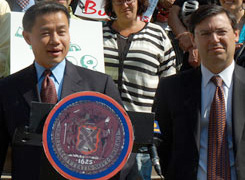The Comptroller Race: Who Will Stand Up for Transit?
 John Liu and David Yassky might be headed for a run-off in the comptroller race.
John Liu and David Yassky might be headed for a run-off in the comptroller race.We’ve got two more citywide elections to review on the eve of tomorrow’s primary vote — the contests for comptroller and public advocate.
If you’re a little unclear about what these positions do, here’s the short version: The comptroller is the city’s financial watchdog, and the public advocate is the watchdog for everything else, evaluating the effectiveness of city policies and sometimes serving as a check against mayoral power. Whoever holds these positions will wield important oversight powers for the next four years, and we’ll probably see one or both of the winners make a run for mayor at some point.
In the right hands, both offices can advance the cause of livable streets. We’ll review the comptroller race first and then take a look at the public advocate contenders later today.
The comptroller can’t cast a vote in Albany for a transit funding package, but he or she can certainly help frame the debate. Democratic mayoral contender Bill Thompson could have used his comptroller’s pulpit to reinforce the Ravitch Commission bridge toll plan this year. Instead he opted to push for vehicle registration fees as an alternative to road pricing, giving the State Senate additional cover for its watered down transit funding package.
The race to succeed Thompson, which will effectively be decided in the Democratic primary, pits four City Council members against each other: David Yassky of Brooklyn, and John Liu, Melinda Katz, and David Weprin of Queens. Neither Katz nor Weprin cleared the most elementary livable streets hurdle during their council tenures, with each siding against congestion pricing in last year’s vote. So let’s review the intriguing Yassky-Liu rivalry.
Liu’s inconsistencies have been well-documented here on Streetsblog. His "yes" vote on congestion pricing in 2008 somehow morphed into vocal opposition to bridge tolls this year. He lectured on pedestrian safety from his post as transportation committee chair, but when DOT actually improved safety with its Midtown reclamation projects, he scolded the city for "expropriating" street space. And when the Bicycle Access Bill came before the City Council, Liu looked ready to scuttle the historic legislation until the last minute. As a comptroller candidate, he has turned to standard-issue MTA bashing as a staple of his campaign.
In addition to sponsoring the Bike Access Bill and shepherding it through the council, Yassky has consistently supported a car-free Prospect Park and helped secure funding for the Bedford Avenue bike parking swap. An early supporter of congestion pricing, Yassky has not made transit funding a signature campaign issue. But in his response to the TA candidate survey, he gives some promising indications that he will use the comptroller’s office to highlight the necessity of funding transit with road pricing.
Pledging to "set up in-depth assessments of the economic impact congestion has" and to "advocate and support policies like congestion pricing," Yassky says his office will "provide a solid platform from which to advocate change." A comptroller who follows through on those promises would be a valuable ally in the fight for sustainable transportation policy in the New York region.